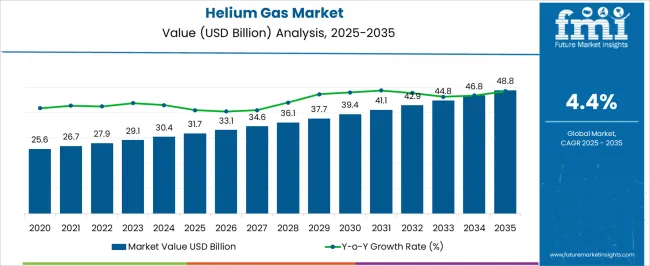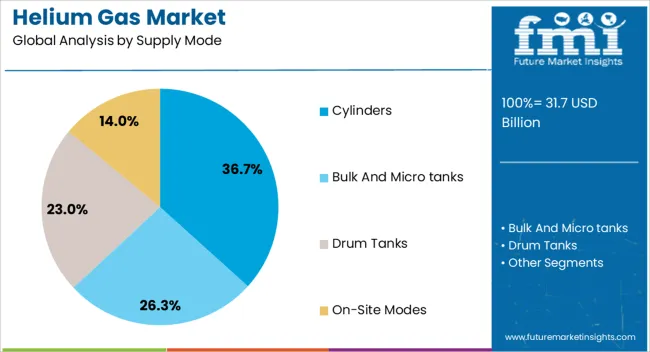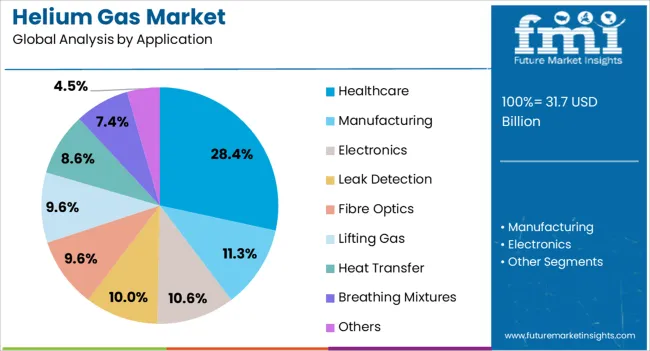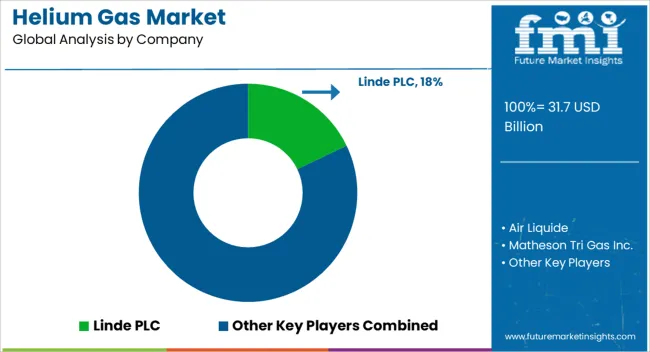The Helium Gas Market is estimated to be valued at USD 31.7 billion in 2025 and is projected to reach USD 48.8 billion by 2035, registering a compound annual growth rate (CAGR) of 4.4% over the forecast period.
The helium gas market is expanding steadily, supported by its critical role across various high-tech, industrial, and medical applications. Press releases and annual reports from gas distribution companies have emphasized growing demand across MRI diagnostics, semiconductors, aerospace, and cryogenics.
Geopolitical developments affecting helium extraction—especially in regions such as the USA, Qatar, and Russia—have influenced global supply chains, prompting strategic stockpiling and new exploration projects. Industry journals have noted the rising importance of securing reliable helium supply, with governments and private sectors investing in long-term contracts and diversified sourcing strategies.
Advancements in leak detection, controlled environments, and fiber optics have increased helium usage in precision-dependent industries. Additionally, healthcare infrastructure expansion in emerging economies has further driven consumption, particularly for medical imaging. The market outlook remains positive as technological advancements continue to create new use cases, and recycling technologies improve supply sustainability. Segmental growth is anticipated to be led by Cylinders as the dominant supply mode and Healthcare as the fastest-growing application due to consistent demand from hospitals and diagnostic centers.

| Metric | Value |
|---|---|
| Helium Gas Market Estimated Value in (2025 E) | USD 31.7 billion |
| Helium Gas Market Forecast Value in (2035 F) | USD 48.8 billion |
| Forecast CAGR (2025 to 2035) | 4.4% |
The market is segmented by Supply Mode and Application and region. By Supply Mode, the market is divided into Cylinders, Bulk And Micro tanks, Drum Tanks, and On-Site Modes. In terms of Application, the market is classified into Healthcare, Manufacturing, Electronics, Leak Detection, Fibre Optics, Lifting Gas, Heat Transfer, Breathing Mixtures, and Others. Regionally, the market is classified into North America, Latin America, Western Europe, Eastern Europe, Balkan & Baltic Countries, Russia & Belarus, Central Asia, East Asia, South Asia & Pacific, and the Middle East & Africa.

The Cylinders segment is projected to contribute 36.7% of the helium gas market revenue in 2025, making it the leading supply mode by share. This segment’s growth has been shaped by its ability to provide portability, ease of storage, and controlled volume usage across varied end-use sectors.
Industries such as laboratories, welding, electronics, and healthcare have preferred cylinders for delivering helium in standardized volumes, ensuring safe handling and pressure stability. Gas suppliers have expanded their cylinder offerings with improved safety features and tracking systems, making them ideal for facilities with intermittent or location-specific helium requirements.
Moreover, cylinders have supported small and mid-sized consumers who do not require large-volume or continuous-flow systems like bulk tanks or on-site generators. The flexibility of deployment, reduced upfront infrastructure investment, and compatibility with existing gas systems have reinforced the widespread use of cylinders, sustaining their lead in helium distribution across both developed and developing markets.

The Healthcare segment is projected to account for 28.4% of the helium gas market revenue in 2025, establishing itself as the leading application area. This segment’s prominence has been driven by helium’s indispensable role in cryogenic cooling for MRI machines, respiratory treatments, and surgical technologies.
Clinical publications and hospital infrastructure reports have identified MRI usage growth as a key contributor, especially with rising diagnostic imaging demand due to aging populations and chronic disease management. Helium’s inert properties and thermal conductivity make it ideal for maintaining superconducting magnets within MRI systems.
Additionally, helium-based gas mixtures have been used in respiratory treatments for conditions like COPD and airway obstruction, enhancing patient outcomes by reducing airflow resistance. Healthcare investments, particularly in diagnostic infrastructure across Asia-Pacific and the Middle East, have amplified helium consumption in medical facilities. With the global push toward strengthening healthcare delivery systems, the Healthcare segment is expected to maintain consistent growth in helium demand over the forecast period.
Rising Demand in the Aerospace Sector Raises the Helium Gas Market Share
The aerospace sector widely demands helium gas in cooling systems. Larger aircraft require better cooling systems with high-pressure-producing gases. This criterion is achieved with the use of helium, benefitting the efficiency of aircraft. This rising demand in the sector enlarges the helium gas market size.
Healthcare Technology Supports Growth Drivers for the Helium Gas Market
With innovations gaining traction in the healthcare industry, different medical instruments use cutting-edge methods to produce better results. Liquid helium possesses excellent cooling properties due to its lower boiling point. Helium is thus in more demand for effective cooling of MRI machine magnets. The helium gas market share is rising in the global landscape.
Helium Shortage Might Affect the Growth Drivers for the Helium Gas Market
Due to the wider uses of helium, the gas is being overused. The ever-increasing demand for gas will likely burden finite resources, creating a shortage. This will be a key challenge, affecting the helium gas market size enlargement.
With reference to the historical growth drivers for the helium gas market, the advancement of the industry was occurring at a CAGR of 3.5%. This propagation lifted the helium gas market size from USD 25.6 billion to USD 29.1 billion from 2020 to 2025.
The growing demand for helium in deep-sea diving raised the helium gas market share. As the gas can reduce the state of drunkenness when added to the mix of oxygen and nitrogen, helium is demanded to ensure the optimum health of sea divers.
Technology will govern the forecasted period. High-speed computing is the field that will likely gain traction, where helium is widely used to enhance the speed of computers. This spurs the gas demand, increasing the helium gas market size.
The growing technological infrastructure in North America will contribute to the growth drivers for the helium gas industry. The area will continue to lead the landscape.
With the progress of the semiconductor ecosystem in the Asia-Pacific region, key players in the helium industry will gain more attention in the area.
Sustainability initiatives in Europe will likely drive producers to seek alternative energy sources, enlarging the helium gas market size.
Forecast CAGRs from 2025 to 2035
| Countries | Forecasted CAGR |
|---|---|
| The United Kingdom | 1.7% |
| The United States of America | 2.4% |
| India | 6.5% |
The United Kingdom will mark extremely sluggish development at a CAGR of 1.7% through 2035.
Cryogenics is an emerging field in the energy sector. With the technological and infrastructural developments, energy storage systems have been evolving. Key players in the helium industry are demanded to fulfill the demand for extreme cooling through cryogenics.
The country, being more focused on renewable energy sources and finding the best alternatives for energy storage systems, drives the helium demand to fulfill the requirements mentioned above, driving the ecosystem.
Key players in the helium industry in the United States will ensure the landscape will progress at a CAGR of 2.4% from 2025 to 2035.
The government of the country is heavily investing in the defense systems. With the Air Force being an integral part of the defense system, investment prospects for all allied industries can be created.
Helium can be used to achieve better propulsion. With the better opportunities created by the US federal, helium use can be channeled into the defense sector.
The healthcare industry in India is expanding. With the government investments in the field, cutting-edge medical instruments are added to large hospitals in the country.
To enhance respiratory assistance provision to patients, helium can be used as a key ingredient in the ventillators. The gas is also used in MRI machinery in many clinics, hospitals, and diagnostic centers. The rising demand in different fields of the healthcare sector will be a fundamental benefit for key players in the helium industry.
Such growth drivers for the helium gas market will elevate the industry size to the highest CAGR of 6.5% through 2035.
With the rising popularity of helium in different industries, the gas can be used to extract metals and non-metals in a safer and controlled environment. Such benefits elevate the demand for helium for maintaining an inert atmosphere. In the context of usability, gas is used the most in the healthcare sector, which has been evident from the discussion carried out so far.
The following two key segments occupy the largest industry share-
| Category | Supply Mode- Metal Nanoparticles |
|---|---|
| Industry Share in 2025 | 73.4% |
Different manufacturing processes, including chemical vapor deposition, gas-phase condensation, and thermal evaporation, use helium gas to create an inert environment. The synthesis of metal nanoparticles could become effective with the use of helium.
This explains the rising helium supply demand, justifying the segment share. The growing segment share also enhances the helium gas market share as the scope of application of the industry is widened.
| Category | End Use- Healthcare |
|---|---|
| Industry Share in 2025 | 25.7% |
Helium is gaining attention in the rapid cooling of superconducting magnets used in the healthcare sector. Key players in the helium industry supply the gas to many medical professionals, where helium is used to enhance the efficiency of such magnets.
Helium also finds applications in the field of anesthesia to ensure a controlled and positive environment for effective surgery. Such factors drive the demand for the segment, enlarging the helium gas market size.

With a better occupancy of key players in the helium industry, the competitive landscape is governed by such competitors. Organizations expand using various strategies, including acquisitions, mergers, and partnerships.
New entrants can mitigate the competitive force with the help of innovation and effective market strategies. A strategic alliance can avail a decisive edge in the industry. The collective ecosystem enhances the helium gas market share.
The following key developments have been observed recently-
Air Liquide, Linde PLC, Matheson Tri Gas Inc., Air Products and Chemical Inc., Air Gas INC., The Messer Group GMBH, Cryoin Engineering Ltd., Chengdu Taiyu Industrial Gases Co. Ltd., Paradox, and Grand Gulf Energy are key competitors in the ecosystem.
Depending on the supply mode, the industry is segmented into Cylinders, Bulk and Micro tanks, Drum tanks, and On-site modes.
Helium gas can be applied effectively in various end-user industries, including Healthcare, Manufacturing, Electronics, Leak Detection, Fibre Optics, Lifting Gas, Heat Transfer, Breathing Mixtures, and Others.
North America, Latin America, Western Europe, Eastern Europe, South Asia and Pacific, East Asia, and The Middle East and Africa are the key contributing regions to the industry.
The global helium gas market is estimated to be valued at USD 31.7 billion in 2025.
The market size for the helium gas market is projected to reach USD 48.8 billion by 2035.
The helium gas market is expected to grow at a 4.4% CAGR between 2025 and 2035.
The key product types in helium gas market are cylinders, bulk and micro tanks, drum tanks and on-site modes.
In terms of application, healthcare segment to command 28.4% share in the helium gas market in 2025.






Full Research Suite comprises of:
Market outlook & trends analysis
Interviews & case studies
Strategic recommendations
Vendor profiles & capabilities analysis
5-year forecasts
8 regions and 60+ country-level data splits
Market segment data splits
12 months of continuous data updates
DELIVERED AS:
PDF EXCEL ONLINE
Gas & Dual-Fuel Injection Systems Market Size and Share Forecast Outlook 2025 to 2035
Gas Desiccant Dehydration Unit Market Size and Share Forecast Outlook 2025 to 2035
Gas Cylinder Market Size and Share Forecast Outlook 2025 to 2035
Gasket and Seal Market Size and Share Forecast Outlook 2025 to 2035
Gas Separation Membrane Market Size and Share Forecast Outlook 2025 to 2035
Gas Jet Compressor Market Size and Share Forecast Outlook 2025 to 2035
Gas Fired Water-Tube Food Processing Boiler Market Size and Share Forecast Outlook 2025 to 2035
Gas Fired Real Estate Generator Market Size and Share Forecast Outlook 2025 to 2035
Gastric-soluble Hollow Capsules Market Size and Share Forecast Outlook 2025 to 2035
Gas Cooling System Market Analysis - Size, Share, and Forecast Outlook 2025 to 2035
Gasoline Gensets Market Size and Share Forecast Outlook 2025 to 2035
Gas Insulated Smart Ring Main Unit Market Size and Share Forecast Outlook 2025 to 2035
Gas Turbine Oil Market Size and Share Forecast Outlook 2025 to 2035
Gas Telecom Generator Market Size and Share Forecast Outlook 2025 to 2035
Gas Insulated Ring Main Unit Market Size and Share Forecast Outlook 2025 to 2035
Gas Fired Condensing Low Temperature Commercial Boiler Market Size and Share Forecast Outlook 2025 to 2035
Gas Insulated Medium Voltage Switchgear Market Size and Share Forecast Outlook 2025 to 2035
Gas Commercial Deep Fryers Market Size and Share Forecast Outlook 2025 to 2035
Gastroesophageal Reflux Disease (GERD) Device Market Analysis - Size, Share, and Forecast Outlook 2025 to 2035
Gas Station Equipment Market Size and Share Forecast Outlook 2025 to 2035

Thank you!
You will receive an email from our Business Development Manager. Please be sure to check your SPAM/JUNK folder too.
Chat With
MaRIA